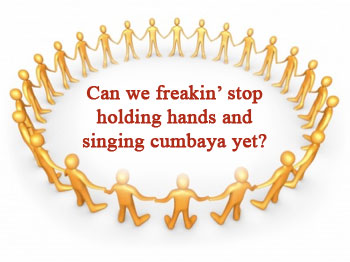I was watching NBC last night, and during one of the commercial breaks on “Heroes,” they had the cast of the show do a small commercial/feature on planting trees out in front of Rockefeller Center in NYC.
I thought, “how nice. they are jumping on this green bandwagon, trying to promote eco friendly ideas and tendencies.”
Then, every NBC show I watched had some major plot element that centered around being “green.”
Then on my local news, there was several feature stories about being eco-friendly, and NBC’s green week.
Then I checked the website to see the schedule, and the whole website is now in hues of green.
Apparently, it is Green Week on NBC.
Turns out, NBC’s parent company, General Electric, has made it “Green Week” for all of their subsidiaries.
When I went to bed, I turned on talk radio, and these guys were blathering on about NBC’s Green Week. I didn’t realize promoting “green” living was such a controversial subject, but apparently they have ruffled some feathers with their green talk. They were going on and on about how Global Warming is not a proven fact, and how the earth warms and cools every few thousands of years… blah blah blah.
As I was listening to these people blather (yes, that is the right word to describe talk radio), I thought to myself, “c’mon guys… what is “Green Week” actually hurting?”
I mean, I’m going to get sick of hearing about how to have a Green Wedding on Days of Our Lives, and leaving a small carbon footprint as you travel through time on Journeyman, or how to be an eco-friendly Hero. I don’t think all this “green” promotion will really enhance the entertainment value of NBC’s shows (which it actually desperately needs), but honestly, what is green week really going to hurt?
What does it hurt to turn the lights off, turn the air conditioning up 2 degrees, drive around less, buy a more fuel efficient car, and recycle your recyclables? Who does it hurt if I use less energy? No one. Who does it hurt if a corporation uses less energy? No one. In fact, being green usually saves you money. Lots of money.
I’m just not understanding what part of that I can feel good about crusading against…
And while I’m on this subject, let me say…
Being “green” is not something you just wake up one morning and decide to do. Being “green” is a process and a way of life. We have been thinking “green” as a nation for several decades, which we don’t give ourselves enough credit for. We have made great strides in being Green:
- Catalytic converters on cars
- Recycling programs in major metro areas
- Better recycling of e-waste: silicon, toner cartridges, batteries, etc.
- Corporate use of email and document control systems to totally replace paper (most e-corporations are almost entirely paperless)
The truth is, we have grown GDP in our nation in the last 30 years while becoming greener and greener. Now is not the time for a radical shift. Let the “green” movement continue organically. We already are green and we keep getting greener and greener as it makes business sense to do so.
We stand at the brink of a new era of “green.” There is a big inflection point in American thinking now centered around looking for the next big breakthrough in energy. Everyone wants less dependence on foreign oil, dirty coal, and politically impossible nuclear energy. Something big will break, we hope. In the meantime, just use less.
It’s really as simple as that.
![]()
